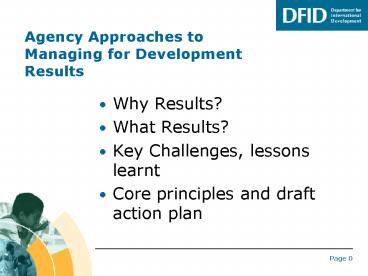Agency Approaches to Managing for Development Results - PowerPoint PPT Presentation
1 / 14
Title:
Agency Approaches to Managing for Development Results
Description:
So that partner countries and cooperation partners can learn what is likely to ... Fungibility of aid. Complexity of credible logic-mapping quality assured ... – PowerPoint PPT presentation
Number of Views:16
Avg rating:3.0/5.0
Title: Agency Approaches to Managing for Development Results
1
Agency Approaches to Managing for Development
Results
- Why Results?
- What Results?
- Key Challenges, lessons learnt
- Core principles and draft action plan
2
Why Do We Need a Results Agenda?
- So that partner countries and cooperation
partners can learn what is likely to lead to
better results, and adapt strategies to improve
our development effectiveness - So that citizens can hold governments accountable
for delivering results - To enable key stakeholders to understand the
contributions of cooperation agencies, thereby
building support for development - So that we broaden our focus on results beyond
the project level to reflect our country business
model and global programs
3
What Do We Mean by Results?
- Sustained improvements in development outcomes
at the country level - Families lifted out of poverty
- Improved literacy
- Increased youth employment
- Greater child survival
4
Whose Results?
- Monterrey agreement results are delivered in
country by Governments - Cooperation partners contribute to country led
results.
5
Challenges/Lessons Learnt (1)
- Aligning with partner countries own priorities,
objectives and results - PRS targets may be over-stated
- Focus on high-level outcomes that remain constant
overtime (MDGs, PRS outcomes) - Agreeing limited set of proxy indicators at the
right level, measurable and country owned.
6
Challenges/Lessons Learnt (2)
- Attribution and aggregation
- Fungibility of aid
- Complexity of credible logic-mapping quality
assured - Respecting country ownership with need to be able
to aggregate results within countries and across
regions - Time lag between interventions and impact on
outcomes
7
Challenges/Lessons Learnt (3)
- Simplicity/Complexity
- Harmonize agency demands for results information
to avoid over-burdening country systems - Fewer high quality indicators that are credible
and rigorous - Danger of focusing on what is easy to measure
rather than what needs to be measured
8
Challenges/Lessons Learnt (4)
- Data quality
- Strengthen partners countries own systems rather
than establishing parallel systems - Lack of donor coordination in country to support
strengthening of ME systems - Poor quality of international data bases and time
lag
9
Challenges/Lessons Learnt (5)
- Budget issues
- Application of RBM to resource allocation
- Dangers of managing by results penalizing poor
performance without adequate analysis of
under-lying factors
10
Internal Bilateral Agency Concerns (1)
- Coherent approach between different Government
ministries - Establishing meaningful targets for global
actions such as policy coherence - Harmonising approach with other implementing
agencies, such as NGOs, Academics etc. - Retaining public support for development when
attribution is weakened and results shared
11
Internal Bilateral Agency Concerns (2)
- Top level leadership essential for embedding
- Significant training demands
- Shift to focus on outcomes can create tension
with sector specialists - Ensuring timely reporting to meet accountability
requirements - Distinguishing between accounting for development
effectiveness and organisational effectiveness.
12
Core Principles (1)
- Rome declaration
- Start from partner countries priorities,
objectives and results - Coordinated approach at all levels
- Strengthen partner countries capacity to measure,
monitor and manage for results.
13
Core Principles (2)
- Focus on results at all stages from planning
through implementation to completion - Align programming, monitoring and evaluation with
agreed country owned results framework - Keep it simple!
- Manage for not by results
- Use RBM for learning and evidence based policy
making.
14
Last Words
- Dont over complicate it
- Beware of the process becoming and end in itself!
- Focus on actions that will make a difference to
progress in poverty reduction - Remember the Monterrey principles whose Results!































